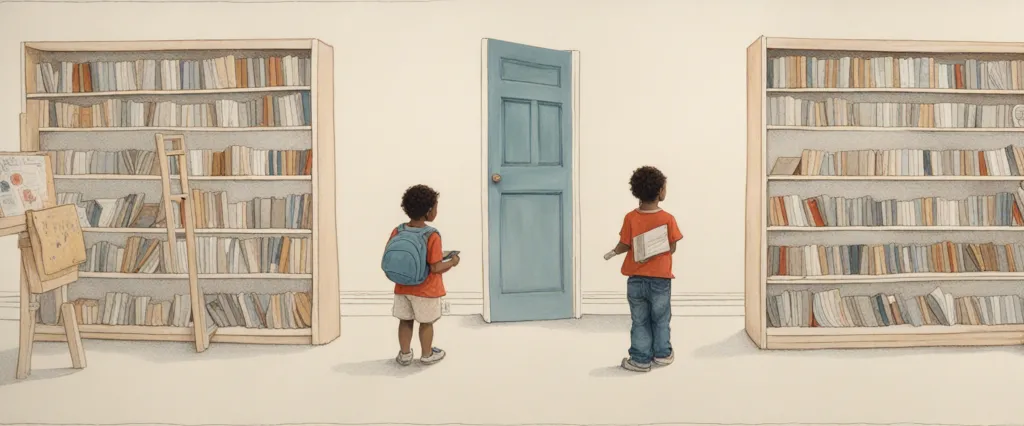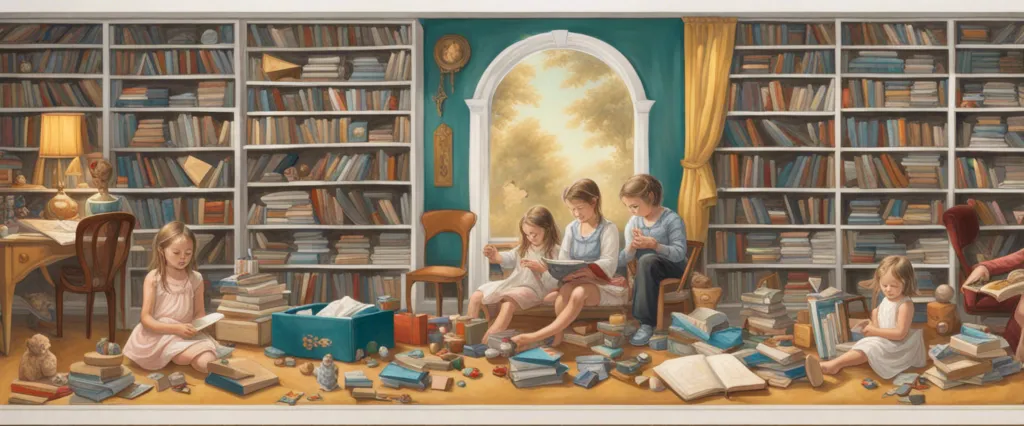——Unequal Childhoods by Annette Lareau & The Rest Is Noise by Alex Ross

In the realm of literature, certain works captivate readers not only through their storyline but also by shedding light on broader social themes. Annette Lareau’s “Unequal Childhoods” and Alex Ross’s “The Rest is Noise” are two such books that delve into profoundly distinct aspects of society, providing readers with invaluable insights into contrasting worlds. While Lareau’s meticulously researched work explores the impact of social class on child-rearing practices, Ross’s critically acclaimed tome unravels the intricate relationship between music and society in the turbulent 20th century. Although these two books may seem disparate at first glance, a comparative study of their narratives offers an intriguing examination of the ways in which socioeconomic factors and artistic expressions shape our understanding of the world. By juxtaposing Lareau’s exploration of the challenges faced by children from different social classes against Ross’s exploration of the transformative power of music, this study aims to illuminate the diverse forces that shape human experiences and prompt readers to question the notion of equality in our society.
Brief Summary of Two Books
Unequal Childhoods by Annette Lareau
Unequal Childhoods by Annette Lareau is a sociological study that examines how social class shapes the experiences and outcomes of children. Lareau conducts in-depth research by observing and interviewing families from different social backgrounds over a period of several years. She focuses on middle-class and working-class families and analyzes their parenting styles, educational practices, and social interactions.
Lareau argues that there are significant disparities between the ways middle-class and working-class parents raise their children. Middle-class parents engage in a style of parenting called “concerted cultivation,” where they actively cultivate their child’s talents, engage them in structured activities, and prioritize their educational success. In contrast, working-class parents adopt a style of parenting termed “natural growth,” which emphasizes allowing children to develop naturally and prioritizes their obedience to authority figures.
These contrasting parenting styles have profound implications for children’s opportunities and outcomes. Middle-class children are often well-prepared for school, assertive in social environments, and have access to various extra-curricular activities. They develop a sense of entitlement and are skilled in negotiating with authority figures. As a result, they tend to attain higher educational levels and have more successful careers.
On the other hand, working-class children often struggle in school, have lower self-esteem, and encounter difficulties in interacting with authority figures. They develop a sense of constraint and are less likely to voice their opinions or challenge rules. Consequently, they tend to have limited educational and career prospects.
Lareau concludes that these divergent parenting practices perpetuate social inequalities and contribute to the reproduction of social class. She suggests that efforts should be made to bridge the parenting divide and create more equal opportunities for children from different social backgrounds.
The Rest Is Noise by Alex Ross
The Rest Is Noise” by Alex Ross is a captivating and comprehensive exploration of 20th-century music. The book takes readers on an enlightening journey through the various musical movements and composers during this period, unraveling the intricate relationships between music and politics, technology, social movements, and cultural changes.
Ross’s narrative begins in the late 19th century and proceeds chronologically, covering significant composers, including Richard Strauss, Arnold Schoenberg, Igor Stravinsky, Dmitri Shostakovich, and Benjamin Britten, among others. He examines the influence of events such as World War I, the rise of totalitarian regimes, and the cultural revolution of the 1960s on musical expression. Ross also delves into the impact of technology, from the development of recording technology to the advent of electronic instruments.
The author presents a narrative that is both accessible and informative, examining how composers responded to the challenges and possibilities of their time. He demystifies complex musical concepts and provides context to the music, allowing readers to gain a deeper understanding and appreciation of the compositions discussed.
Throughout the book, Ross explores a wide range of genres, including classical, jazz, opera, and film music. He discusses the political ideologies that influenced composers, while also highlighting the personal struggles and creative breakthroughs of individual artists. By examining not only the music itself but also the historical, social, and cultural milieu in which it was created, Ross offers readers a multidimensional perspective on 20th-century music.
“The Rest Is Noise” is a critically acclaimed and thought-provoking book that bridges the gap between the specialist and the general reader. It invites both enthusiasts and newcomers to explore and engage with the rich musical landscape of the 20th century, illuminating the profound impact that music had on society and reflecting the profound impact society had on music.
Comparison between Two Books

Similarities in Social Documentary
Both “Unequal Childhoods” by Annette Lareau and “The Rest Is Noise” by Alex Ross can be categorized as social documentaries. Although they explore different subject matters – one focuses on socio-economic disparities in parenting styles, while the other examines the impact of music on society – there are several key similarities in their approach to social documentation.
1. Objective Observations: Both books rely heavily on observational research to present an objective view of their respective subjects. Lareau extensively studied and observed families from various socio-economic backgrounds to understand the impact of parenting styles on child development. Similarly, Ross delves into historical archives, conducts interviews, and attends music performances to piece together the narrative of 20th-century classical music and its social implications.
2. In-Depth Interviews: To complement their observational research, both authors conduct interviews with individuals directly involved in their subjects. Lareau interviews parents, children, teachers, and community members to gain insight into the everyday experiences and perspectives of different social classes. Likewise, Ross interviews composers, musicians, critics, and patrons of classical music, providing a comprehensive range of perspectives on the genre’s cultural significance.
3. Personal Narratives: Both authors incorporate personal narratives to humanize their subjects and draw readers into their stories. Lareau focuses on the experiences of individual families, highlighting the unique challenges and opportunities they face based on their socio-economic backgrounds. Ross weaves together biographical sketches of composers, anecdotes from musicians, and personal reflections on attending performances, illustrating the transformative power of music in people’s lives.
4. Historical Context: Both books provide historical context to situate their subjects within larger social frameworks. Lareau examines the historical roots of class inequality and its influence on parenting styles in the United States. Ross explores the historical, political, and cultural circumstances that shaped classical music throughout the 20th century. By elucidating historical contexts, both authors help readers understand the broader social forces at play in their respective subjects.
5. Analytical Frameworks: Both books employ analytical frameworks to interpret and explain their findings. Lareau uses the concept of “concerted cultivation” versus “natural growth” to analyze the parenting styles she observes, showing how differing approaches perpetuate social inequality. Ross draws on music theory, cultural analysis, and historical scholarship to elucidate the aesthetic, political, and social dimensions of classical music, providing a nuanced understanding of its impact.
Overall, despite focusing on distinct topics, “Unequal Childhoods” and “The Rest is Noise” share similarities in their approach to social documentary. Both books combine objective observations, interviews, personal narratives, historical context, and analytical frameworks to shed light on the social dynamics and implications of their subjects. These similarities contribute to their effectiveness as social documentaries, fostering a deeper understanding of the complex interplay between society, culture, and individuals.
Divergences in Social Documentary
Unequal Childhoods by Annette Lareau and The Rest Is Noise by Alex Ross are two notable books that diverge when it comes to social documentary. While both books explore aspects of society and human experiences, they differ in terms of their approach, subject matter, and overall purpose.
In Unequal Childhoods, Annette Lareau focuses on the unequal opportunities and experiences that children from different social classes encounter while growing up. Lareau uses a combination of observational research, interviews, and in-depth case studies to document the stark differences in parenting styles, educational practices, and cultural capital between working-class and middle-class families. Her aim is to shed light on the ways in which these disparities perpetuate social inequality, emphasizing the impact they have on children’s future prospects and life trajectories. Lareau’s approach is rooted in sociological research, providing a comprehensive analysis of various social factors influencing childhood experiences.
On the other hand, The Rest Is Noise by Alex Ross takes a broader approach by exploring the influence of music on society, politics, and culture in the 20th century. Rather than focusing solely on social class disparities, Ross delves into the impact of music through a combination of historical research, biographical accounts, and cultural analysis. He examines the interconnectedness of music and the various political and social movements of the time, providing a comprehensive panorama of how music both reflects and shapes the world around us. While social inequality is not the primary focus of Ross’s book, it certainly plays a role in shaping the cultural landscape he describes.
The divergence in these books’ approaches to social documentary is evident in their subject matter and overall purpose. Lareau’s Unequal Childhoods hones in on social class disparities in childhood experiences and their long-term consequences. Through her research, she seeks to highlight the structural inequalities that perpetuate disadvantages for certain groups of children. In contrast, Ross’s The Rest Is Noise takes a broader view, exploring the intersections between music, history, and society. While social inequality is not the main theme in Ross’s book, he acknowledges its presence and its influence on how music has been created, received, and celebrated.
In conclusion, although both Unequal Childhoods and The Rest Is Noise delve into aspects of society and human experiences, the divergence lies in their approaches to social documentary. Lareau’s book provides a detailed analysis of social class disparities in childhood experiences, while Ross’s book offers a wider exploration of music’s impact on society, acknowledging social inequality as part of the cultural landscape he describes.

Conclusion
Both Unequal Childhoods by Annette Lareau and The Rest Is Noise by Alex Ross are highly acclaimed books in their respective fields. However, the choice between the two ultimately depends on personal preference and interest.
If you are interested in sociology and the study of social class and the impact it has on children’s lives, Unequal Childhoods would be a worthy read. Annette Lareau presents an in-depth analysis of how social class shapes parenting styles and affects children’s experiences, providing valuable insights into the unequal opportunities and outcomes in society.
On the other hand, if you have a passion for music and are intrigued by the history of 20th-century music, The Rest Is Noise would be the more suitable choice. Alex Ross takes readers on a journey through the diverse and transformative world of classical music, exploring the lives and works of various composers and capturing the cultural and social context of their time.
Ultimately, it depends on your personal interests and what topic you find more appealing. Both books have been praised for their insightful narratives and depth of research, so either choice would provide a worthy reading experience.


